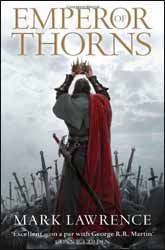|
Click here to return to the main site. Book Review
Jorg has come far since he was hung, aged nine, in thorns having to witness his brother’s death. Stabbed by his own father, his anger and aggression has won him a kingdom, but he has his eye on a greater prize. Every four years the one hundred rulers of the lands gather in the capital of Vyene to elect an Emperor, but for the last one hundred years the fractured political landscape has meant that no one person has been chosen. Jorg means to change this and it has never been so urgent. With the King of the Dead on the move, only an Emperor has a chance of standing against this new threat... Emperor of Thorns (576 pages) is the third and last book in the science fiction/fantasy series by Mark Lawrence. If you have followed the series so far, then you realise that the intricate plotting of the story and Lawrence’s writing skills continued to be two of the stories high points. Up to now the story has been split between two time periods, the past informing the future. This relationship is central to the book on almost every level. The story happens in Europe, but not one we would recognise. This is not akin to Tolkien’s use of the geography where he overlaid Middle Earth on top, with Hobbiton placed in England and Mordor in Italy. From the map provided this is most obviously Europe with a changed geography, but mostly recognisable place names and institutions. What at first seems like another medieval fantasy jaunt turns out to be so much more as the story is set in the far future where a man made apocalypse nearly destroyed the planet, pushing back civilisation thousands of years. The past has not gone away and part of Jorg’s journey is to discover just what the builders had done which altered the basic quantum nature of reality, allowing, like the Krell machine a breakdown of the barriers between the internal and external world. One change that the book embraces is to tell the story from three perspectives, rather than the normal two, which helps illuminate some aspects of the externalised internal world. Another very welcome change is the quick recap provided, for those whose memories have dimmed. This also means that although the book is part of a trilogy, it works just as well as a stand-alone novel. One of the things which some have expressed reservations about is the almost negative nature of Jorg. In a conventional novel, due to the level of violence, he would normally be considered the villain. In the context of the story his almost psychopathic tendencies are what allows him to survive in an environment which is singularly hostile, this is not the world that the meek were promised. The book builds to a satisfying ending and taken as a whole, this has been an impressive series, which nearly converted even a diehard fantasy sceptic, like me. The science fiction fan inside me would love Lawrence to go back and chronicle the downfall of the builders, much of the story is hinted at, but a full blown explanation would be a real gift for his fans. 9 Charles Packer Buy this item online
|
|---|



